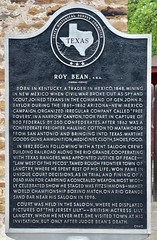Law West of The Pecos. Judge Roy Bean lived a life in which fiction became so intermingled with fact that he became a legend within his lifetime. Basis for his renown were the decisions which he reached in this building as the Law West of the Pecos. Court was held as frequently on the porch, spectators grouped about on horseback, as within the building. Nor was Bean above breaking off proceedings long enough to serve customers seeking services dispensed by the other businesses carried on in his courtroom-home. The Judge's "law library" consisted of a single volume, an 1879 copy of the Revised Statutes of Texas. He seldom consulted it, however, calling instead on his own ideas about the brand of justice which should apply. This he effectively dispensed together with liberal quantities of bluff and bluster. Since Langtry had no jail, all offenses were deemed finable with Beam pocketing the fines. Drunken prisoners often were chained to mesquite trees in front of the building until they sobered up enough to stand trial. Bean reached a peak of notoreity when, on February 21, 1896, he staged the banned Fitzsimmons-Maher heavyweight title fight on a sand bar in the Rio Grande River, a stone's throw from his front porch. By holding it on Mexican territory he outwitted Texas Rangers sent to stop the match -- and turned a handsome profit for his shrewdness. This building was named the "Jersey Lilly" for the famous English actress Lillie Langtry whom Bean admired and for whom he claimed to have named the town. His lamp frequently burned into the night as he composed letters to her. But he never saw her since her only visit to Langtry occurred in 1904, less than a year after Bean died. #3052
by Texas Historical Commission #03052 of the Texas Historical Marker series
Colour: black
Wikimedia:
Flickr:



